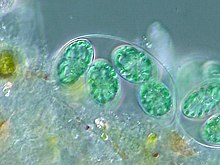灰藻:修订间差异
Interaccoonale(留言 | 贡献) 外类群 标签:2017版源代码编辑 |
Interaccoonale(留言 | 贡献) 特征 标签:2017版源代码编辑 |
||
| 第17行: | 第17行: | ||
==特征== |
==特征== |
||
灰藻的[[色素體|质体]]也称为蓝小体(cyanelles)或灰质体(cyanoplasts),与其他植物的质体不同,灰藻的质体被[[肽聚糖]]包被,证明其曾与[[藍菌門|蓝藻]][[共生體學說|内共生]],从而获得质体<ref name="keeling" /><ref name="Miyagishima">{{cite journal|title=DipM is required for peptidoglycan hydrolysis during chloroplast division|first1=Shin-ya|last2=Kabeya|first2=Yukihiro|journal=BMC Plant Biology|doi=10.1186/1471-2229-14-57|year=2014|volume=14|pages=57|pmc=4015805|pmid=24602296|last3=Sugita|first3=Chieko|last4=Sugita|first4=Mamoru|last5=Fujiwara|first5=Takayuki|last1=Miyagishima}}</ref>。灰藻含有[[叶绿素]]a<ref name="keeling" />,与[[紅藻門|紅藻]]和[[藍菌門|蓝藻]]一样<ref name="keeling" />通过藻胆体(Phycobilisome)接收光合作用所需要的阳光,这一结构中含有大量的[[藻膽蛋白]],[[绿色植物]]已经丧失了这种化学物质<ref name=Skuja>Skuja, A. (1948). Taxonomie des Phytoplanktons einiger Seen in Uppland, Schweden. Symbolae Botanicae Upsalienses 9(3): 1-399.{{AlgaeBase taxon|id=4301|name=Glaucophyta}}</ref>。灰藻的特性还有,其碳固定过程在[[细胞质基质]]中进行,同样与红藻类似而与绿色植物的不同<ref name="ball_2011">{{cite journal|last1=Ball|first1=S.|last2=Colleoni|first2=C.|last3=Cenci|first3=U.|last4=Raj|first4=J. N.|last5=Tirtiaux|first5=C.|title=The evolution of glycogen and starch metabolism in eukaryotes gives molecular clues to understand the establishment of plastid endosymbiosis|journal=Journal of Experimental Botany|date=10 January 2011|volume=62|issue=6|pages=1775–1801|doi=10.1093/jxb/erq411|pmid=21220783}}</ref>。 |
|||
灰藻含有[[線粒體]],其具有平滑的[[线粒体嵴|嵴]],以没有[[中心粒]]的方式行[[有絲分裂|有丝分裂]]。能运动的状态下的灰藻具有不等长的两根鞭毛。<ref name=Skuja/> |
|||
==系统发育与分类== |
==系统发育与分类== |
||
2019年2月4日 (一) 05:38的版本
| 灰藻 | |
|---|---|

| |
| Glaucocystis sp. | |
| 科学分类 | |
| 域: | 真核域 Eukaryota |
| 演化支: | 多貌生物 Diaphoretickes |
| 演化支: | 原始质体生物 Archaeplastida |
| 门: | 灰藻门 Glaucophyta Skuja 1948 |
| Class | |
| |
| 異名 | |
| |
灰藻(Glaucophytes,Glaucocystophytes或Glaucocystids),也叫灰胞藻是原始色素体生物的一支,是一类稀见的小型淡水藻类,具有独特的灰质体[1]。灰藻的近缘类群有红藻、皮胆虫、绿色植物和隐藻,这些类群间的系统发育关系尚不明晰,有待进一步研究[2]。
灰藻可能是原始色素体生物的基部类群,具有较为原始的质体,对其的研究有助于揭示叶绿体、绿藻和红藻的演化历史,因此备受学界关注[1][3]。
特征
灰藻的质体也称为蓝小体(cyanelles)或灰质体(cyanoplasts),与其他植物的质体不同,灰藻的质体被肽聚糖包被,证明其曾与蓝藻内共生,从而获得质体[1][4]。灰藻含有叶绿素a[1],与紅藻和蓝藻一样[1]通过藻胆体(Phycobilisome)接收光合作用所需要的阳光,这一结构中含有大量的藻膽蛋白,绿色植物已经丧失了这种化学物质[5]。灰藻的特性还有,其碳固定过程在细胞质基质中进行,同样与红藻类似而与绿色植物的不同[6]。
灰藻含有線粒體,其具有平滑的嵴,以没有中心粒的方式行有丝分裂。能运动的状态下的灰藻具有不等长的两根鞭毛。[5]
系统发育与分类
外类群
灰藻的近缘类群有红藻、皮胆虫、绿色植物和隐藻,这些类群间的系统发育关系尚不明晰,不同研究组的研究结果多有不同。
湯瑪斯·卡弗利爾-史密斯研究组[7]:
| 原始色素体生物 |
| ||||||||||||||||||||||||
帕特里克 J. 基林(Patrick J. Keeling)研究组[8]:
| 原始色素体生物 |
| ||||||||||||||||||||||||
阿拉斯泰尔 G. B. 辛普森(Alastair G. B. Simpson)研究组[9]:
| 原始色素体生物 |
| ||||||||||||||||||||||||
Fabien Burki研究组[10]:
| 原始色素体生物 |
| ||||||||||||||||||||||||
内类群
根据目前的研究,灰藻的内部系统发育关系如下。[11]
| 灰藻 Glaucocystophyceae |
| ||||||||||||||||||||||||
分类表
灰藻在历史上曾被视为绿藻纲绿球藻目Oocystaceae科的一个子类群,但目前被视为与绿藻独立的植物类群。[12]
目前已有13种灰藻被发现,但没有一种是广布种,其被置于五个属中,其分类表如下:[1]
- 灰藻门 Phylum Glaucophyta Skuja 1948
- 灰藻纲 Class Glaucocystophyceae Schaffner 1922 [Cyanophorophyceae]
- 蓝载藻目 Order Cyanophorales Kies & Kramer 1986
- 蓝载藻科 Family Cyanophoraceae Kies & Kramer 1986
- Genus ?Peliaina Pascher 1929
- Peliaina cyanea Pascher 1929
- Genus ?Strobilomonas Schiller 1954
- Strobilomonas cyaneus Schiller 1954
- 蓝载藻属 Genus Cyanophora Korshikov 1924 (能够运动,缺乏细胞壁)
- C. tetracyanea Korshikov 1941
- C. biloba Kugrens et al. 1999
- C. sudae Takahashi & Nozaki 2014
- C. paradoxa Korshikov 1924
- C. kugrensii Takahashi & Nozaki 2014
- C. cuspidata Takahashi & Nozaki 2014
- Genus ?Peliaina Pascher 1929
- 蓝载藻科 Family Cyanophoraceae Kies & Kramer 1986
- 灰黏毛藻目 Order Gloeochaetales Kies & Kremer 1986
- 灰黏毛藻科 Family Gloeochaetaceae Bohlin 1901 ex Skuja 1954
- 蓝褶藻属 Genus Cyanoptyche Pascher 1929 (在四个属中最缺乏研究)
- 蓝褶藻属 Cyanoptyche gloeocystis Pascher 1929
- 灰黏毛藻属 Genus Gloeochaete von Lagerheim 1883 [Schrammia Dangeard 1889 non Britton & Rose 1930 non Guppy 1895; Cyanochaete Gobi 1916] (具有可运动和不可运动的阶段,细胞壁似乎不是由纤维素组成)
- G. protogenita Kutzing
- G. wittrockiana von Lagerheim 1883
- 蓝褶藻属 Genus Cyanoptyche Pascher 1929 (在四个属中最缺乏研究)
- 灰黏毛藻科 Family Gloeochaetaceae Bohlin 1901 ex Skuja 1954
- 灰藻目 Order Glaucocystales Bessey 1907
- 灰藻科 Family Glaucocystidaceae Bohlin 1901 ex West 1904
- Genus Glaucocystopsis Bourrelly 1961
- Glaucocystopsis africana Bourrelly 1961
- 灰藻属 Genus Glaucocystis Itzigsohn 1868 (不能运动,但鞭毛作为痕迹器官保留了下来,具有纤维素的细胞壁。)
- G. bullosa (Kützing 1836) Wille 1919
- G. caucasica Tarnogradskii 1957
- G. cingulata Bohlin 1897
- G. duplex Prescott 1944
- G. molochinearum Geitler
- G. simplex Tarnogradskii 1959
- G. nostochinearum Itzigsohn 1868 ex Rabenh. 1935
- G. geitleri Pringsheim 1958 ex Takahashi & Nozaki 2016
- G. incrassata (Lemmermann 1908) Takahashi & Nozaki 2016
- G. miyajii Takahashi & Nozaki 2016
- G. bhattacharyae Takahashi & Nozaki 2016
- G. oocystiformis Prescott 1944
- Genus Glaucocystopsis Bourrelly 1961
- 灰藻科 Family Glaucocystidaceae Bohlin 1901 ex West 1904
- 蓝载藻目 Order Cyanophorales Kies & Kramer 1986
- 灰藻纲 Class Glaucocystophyceae Schaffner 1922 [Cyanophorophyceae]
参考资料
- ^ 1.0 1.1 1.2 1.3 1.4 1.5 Patrick J. Keeling. Diversity and evolutionary history of plastids and their hosts. American Journal of Botany. 2004, 91 (10): 1481–1493. PMID 21652304. doi:10.3732/ajb.91.10.1481.
- ^ Jeffrey D. Palmer, Douglas E. Soltis & Mark W. Chase. The plant tree of life: an overview and some points of view. American Journal of Botany. 2004, 91 (10): 1437–1445. PMID 21652302. doi:10.3732/ajb.91.10.1437.
- ^ Eunsoo Kim & Linda E. Graham. Redfield, Rosemary Jeanne , 编. EEF2 Analysis Challenges the Monophyly of Archaeplastida and Chromalveolata. PLoS ONE. 2008, 3 (7): e2621. PMC 2440802
 . PMID 18612431. doi:10.1371/journal.pone.0002621.
. PMID 18612431. doi:10.1371/journal.pone.0002621.
- ^ Miyagishima, Shin-ya; Kabeya, Yukihiro; Sugita, Chieko; Sugita, Mamoru; Fujiwara, Takayuki. DipM is required for peptidoglycan hydrolysis during chloroplast division. BMC Plant Biology. 2014, 14: 57. PMC 4015805
 . PMID 24602296. doi:10.1186/1471-2229-14-57.
. PMID 24602296. doi:10.1186/1471-2229-14-57.
- ^ 5.0 5.1 Skuja, A. (1948). Taxonomie des Phytoplanktons einiger Seen in Uppland, Schweden. Symbolae Botanicae Upsalienses 9(3): 1-399.Template:AlgaeBase taxon
- ^ Ball, S.; Colleoni, C.; Cenci, U.; Raj, J. N.; Tirtiaux, C. The evolution of glycogen and starch metabolism in eukaryotes gives molecular clues to understand the establishment of plastid endosymbiosis. Journal of Experimental Botany. 10 January 2011, 62 (6): 1775–1801. PMID 21220783. doi:10.1093/jxb/erq411.
- ^ Cavalier-Smith, Thomas; Chao, Ema E.; Lewis, Rhodri. Multiple origins of Heliozoa from flagellate ancestors: New cryptist subphylum Corbihelia, superclass Corbistoma, and monophyly of Haptista, Cryptista, Hacrobia and Chromista. Molecular Phylogenetics and Evolution. 2015-12-01, 93: 331–362. ISSN 1055-7903. doi:10.1016/j.ympev.2015.07.004.
- ^ Burki, Fabien. Kaplan, Maia; Trikhonenkov, Denis V.; Zlatogursky, Vasily; Minh, Bui Quang; Radaykina, Liudmila V.; Smirnov, Alexey; Mylnikov, Alexander P. et al.. Untangling the early diversification of eukaryotes: A phylogenomic study of the evolutionary origins of Centrohelida, Haptophyta and Cryptista. Proceedings of the Royal Society B. 2016, 283 (1823): 20152802. doi:10.1098/rspb.2015.2802.
- ^ Simpson, Alastair G. B.; Roger, Andrew J.; Erin M. Bertrand; Eme, Laura; Eglit, Yana; Lax, Gordon. Hemimastigophora is a novel supra-kingdom-level lineage of eukaryotes. Nature. 2018-12, 564 (7736): 410–414. ISSN 1476-4687. doi:10.1038/s41586-018-0708-8 (英语).
- ^ Burki, Fabien; Tikhonenkov, Denis V.; Mylnikov, Alexander P.; Jamy, Mahwash; Strassert, Jürgen F. H. New phylogenomic analysis of the enigmatic phylum Telonemia further resolves the eukaryote tree of life. Molecular Biology and Evolution. doi:10.1093/molbev/msz012 (英语).
- ^ Price, Dana C.; Steiner, Jürgen M.; Yoon, Hwan Su; Bhattacharya, Debashish; Löffelhardt, Wolfgang. Glaucophyta. Handbook of the Protists: 1–65. 2017. ISBN 978-3-319-32669-6. doi:10.1007/978-3-319-32669-6_42-1.
- ^ http://cfb.unh.edu/phycokey/Choices/Glaucophyceae/GLAUCOCYSTIS/Glaucocystis_key.html
